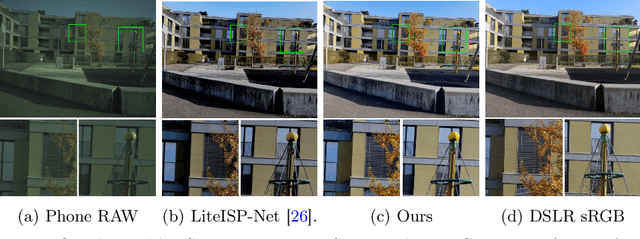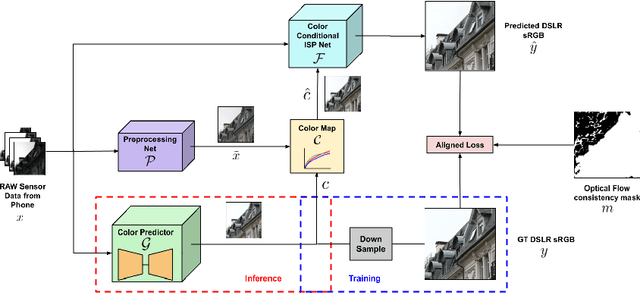Ardhendu Shekhar Tripathi
Transform your Smartphone into a DSLR Camera: Learning the ISP in the Wild
Mar 22, 2022



Abstract:We propose a trainable Image Signal Processing (ISP) framework that produces DSLR quality images given RAW images captured by a smartphone. To address the color misalignments between training image pairs, we employ a color-conditional ISP network and optimize a novel parametric color mapping between each input RAW and reference DSLR image. During inference, we predict the target color image by designing a color prediction network with efficient Global Context Transformer modules. The latter effectively leverage global information to learn consistent color and tone mappings. We further propose a robust masked aligned loss to identify and discard regions with inaccurate motion estimation during training. Lastly, we introduce the ISP in the Wild (ISPW) dataset, consisting of weakly paired phone RAW and DSLR sRGB images. We extensively evaluate our method, setting a new state-of-the-art on two datasets.
Few-Shot Classification By Few-Iteration Meta-Learning
Oct 01, 2020



Abstract:Learning in a low-data regime from only a few labeled examples is an important, but challenging problem. Recent advancements within meta-learning have demonstrated encouraging performance, in particular, for the task of few-shot classification. We propose a novel optimization-based meta-learning approach for few-shot classification. It consists of an embedding network, providing a general representation of the image, and a base learner module. The latter learns a linear classifier during the inference through an unrolled optimization procedure. We design an inner learning objective composed of (i) a robust classification loss on the support set and (ii) an entropy loss, allowing transductive learning from unlabeled query samples. By employing an efficient initialization module and a Steepest Descent based optimization algorithm, our base learner predicts a powerful classifier within only a few iterations. Further, our strategy enables important aspects of the base learner objective to be learned during meta-training. To the best of our knowledge, this work is the first to integrate both induction and transduction into the base learner in an optimization-based meta-learning framework. We perform a comprehensive experimental analysis, demonstrating the effectiveness of our approach on four few-shot classification datasets.
 Add to Chrome
Add to Chrome Add to Firefox
Add to Firefox Add to Edge
Add to Edge